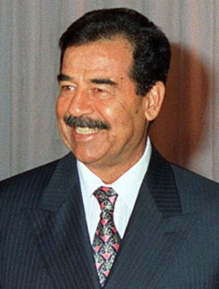
Saddam Hussein Abd al-Majid al-Tikriti was an Iraqi politician who served as the fifth president of Iraq from 16 July 1979 until 9 April 2003. A leading member of the revolutionary Arab Socialist Ba'ath Party, and later, the Baghdad-based Ba'ath Party and its regional organization, the Iraqi Ba'ath Party—which espoused Ba'athism, a mix of Arab nationalism and Arab socialism—Saddam played a key role in the 1968 coup that brought the party to power in Iraq.

Iraq actively researched and later employed weapons of mass destruction (WMD) from 1962 to 1991, when it destroyed its chemical weapons stockpile and halted its biological and nuclear weapon programs as required by the United Nations Security Council. The fifth President of Iraq, Saddam Hussein, was internationally condemned for his use of chemical weapons during the 1980s campaign against Iranian and Kurdish civilians during and after the Iran–Iraq War. In the 1980s, Saddam pursued an extensive biological weapons program and a nuclear weapons program, though no nuclear bomb was built. After the Persian Gulf War (1990–1991), the United Nations located and destroyed large quantities of Iraqi chemical weapons and related equipment and materials; Iraq ceased its chemical, biological and nuclear programs.

United Nations Special Commission (UNSCOM) was an inspection regime created by the United Nations to ensure Iraq's compliance with policies concerning Iraqi production and use of weapons of mass destruction after the Gulf War. Between 1991 and 1997 its director was Rolf Ekéus; from 1997 to 1999 its director was Richard Butler.

The Oil-for-Food Programme (OIP), established by the United Nations in 1995 was established to allow Iraq to sell oil on the world market in exchange for food, medicine, and other humanitarian needs for ordinary Iraqi citizens without allowing Iraq to boost its military capabilities.

Iraq under Saddam Hussein saw severe violations of human rights, which were considered to be among the worst in the world. Secret police, state terrorism, torture, mass murder, genocide, ethnic cleansing, rape, deportations, extrajudicial killings, forced disappearances, assassinations, chemical warfare, and the destruction of the Mesopotamian marshes were some of the methods Saddam and the country's Ba'athist government used to maintain control. The total number of deaths and disappearances related to repression during this period is unknown, but is estimated to be at least 250,000 to 290,000 according to Human Rights Watch, with the great majority of those occurring as a result of the Anfal genocide in 1988 and the suppression of the uprisings in Iraq in 1991. Human Rights Watch and Amnesty International issued regular reports of widespread imprisonment and torture.

The Iraqi no-fly zones conflict was a low-level conflict in the two no-fly zones (NFZs) in Iraq that were proclaimed by the United States, United Kingdom, and France after the Gulf War of 1991. The United States stated that the NFZs were intended to protect the ethnic Kurdish minority in northern Iraq and Shiite Muslims in the south. Iraqi aircraft were forbidden from flying inside the zones. The policy was enforced by the United States and the United Kingdom until 2003, when it was rendered obsolete by the 2003 invasion of Iraq. French aircraft patrols also participated until France withdrew in 1996.

The Iraq Survey Group (ISG) was a fact-finding mission sent by the multinational force in Iraq to find the weapons of mass destruction alleged to be possessed by Iraq that had been the main ostensible reason for the invasion in 2003. Its final report, Comprehensive Report of the Special Advisor to the Director of Central Intelligence on Iraq WMD, was submitted to Congress and the president in 2004. It consisted of a 1,400-member international team organized by the Pentagon and Central Intelligence Agency to hunt for the alleged stockpiles of weapons of mass destruction, including chemical and biological agents, and any supporting research programs and infrastructure that could be used to develop WMD. The report acknowledged that only small stockpiles of chemical WMDs were found, the numbers being inadequate to pose a militarily significant threat.
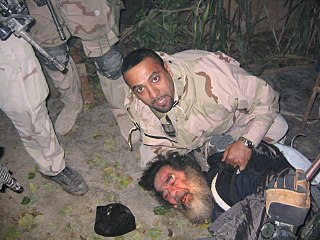
Operation Red Dawn was a military operation by the United States where Saddam Hussein, deposed president of Iraq, was captured in the town of Ad-Dawr, Iraq on 13 December 2003. It was named after the 1984 American film Red Dawn.
Huda Salih Mahdi Ammash is an Iraqi scientist and academic, often demonized as "Mrs. Anthrax" by Anglo-American media for her unproven association with the discontinued Iraqi biological weapons program as a part of the propaganda campaign to justify the Iraq War. Ammash was number 53 on the Pentagon's list of the 55 most wanted, the five of hearts in the deck of Most wanted Iraqi playing cards, and the only woman to be featured. She was captured by coalition forces but later released without being charged.
The following lists events in the year 2003 in Iraq.
Benon Vahe Sevan was the head of the United Nations' Oil-for-Food Programme, established in 1996 and charged with preventing Iraq's government from using the proceeds from oil exports for anything but food, medicine and other items to benefit the civilian population.
The sanctions against Iraq were a comprehensive financial and trade embargo imposed by the United Nations Security Council (UNSC) on Iraq. They began August 6, 1990, four days after Iraq's invasion of Kuwait, stayed largely in force until May 22, 2003, and persisted in part, including reparations to Kuwait. The original stated purposes of the sanctions were to compel Iraq to withdraw from Kuwait, to pay reparations, and to disclose and eliminate any weapons of mass destruction. In December 2021, Iraq's central bank announced that it had paid off its entire debt of $52 billion in war reparations to Kuwait.

The trial of Saddam Hussein was the trial of the deposed President of Iraq Saddam Hussein by the Iraqi Interim Government for crimes against humanity during his time in office.

The rationale for the Iraq War, both the 2003 invasion of Iraq and the subsequent hostilities, was controversial because the George W. Bush administration began actively pressing for military intervention in Iraq in late 2001. The primary rationalization for the Iraq War was articulated by a joint resolution of the United States Congress known as the Iraq Resolution.
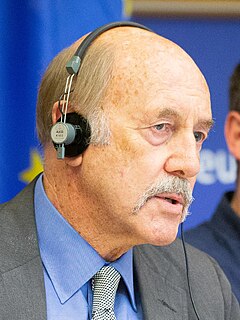
Denis J. Halliday was the United Nations Humanitarian Coordinator in Iraq from 1 September 1997 until 1998. He was previously Deputy Resident Representative to Singapore of the United Nations Development Programme. He is Irish and holds an M.A. in Economics, Geography and Public Administration from Trinity College, Dublin.
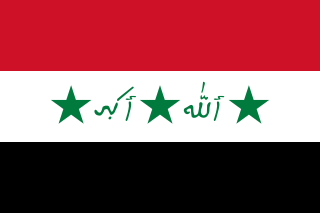
Ba'athist Iraq, formally the Iraqi Republic until 6 January 1992 and the Republic of Iraq thereafter, covers the national history of Iraq between 1968 and 2003 under the rule of the Arab Socialist Ba'ath Party. This period began with high economic growth and soaring prosperity, but ended with Iraq facing social, political, and economic stagnation. The average annual income decreased both because of external factors and the internal policies of the Iraqi government.
The AWB oil-for-wheat scandal refers to the payment of kickbacks to the regime of Saddam Hussein in contravention of the United Nations Oil-for-Food Humanitarian Programme. AWB Limited is a major grain marketing organisation based in Australia. For much of the 20th and early 21st century, it was an Australian Government entity operating a single desk regime over Australian wheat, meaning it alone could export Australian wheat, which it paid a single price for. In the mid-2000s, it was found to have been, through middlemen, paying kickbacks to the regime of Saddam Hussein, in exchange for lucrative wheat contracts. This was in direct contradiction of United Nations Sanctions, and of Australian law.
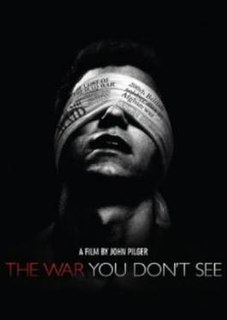
The War You Don't See is a 2010 British documentary film written, produced and directed by John Pilger with Alan Lowery, which challenges the media for the role they played in the Iraq, Afghanistan, and Israel/Palestine conflicts. The film, which went on nationwide general release on 13 December 2010, had its premiere at the Barbican and was aired through Britain's ITV1 on 14 December 2010 and later through Australia's SBS One on 10 April 2011.
Rihab Rashid Taha al-Azawi is an Iraqi microbiologist, dubbed Dr Germ by United Nations weapons inspectors, who worked in Saddam Hussein's biological weapons program. A 1999 report commissioned by the United States Joint Chiefs of Staff and the Defense Intelligence Agency (DIA) named her as one of the world's most dangerous women. Dr Taha admitted producing germ warfare agents but said they had been destroyed.

Utopia is a 2013 documentary film written, produced and presented by John Pilger and directed by Pilger and Alan Lowery, that explores the experiences of Aboriginal Australians in modern Australia. The title is derived from the Aboriginal homeland community of Utopia, Northern Territory, one of the poorest and most desolate areas in Australia.













